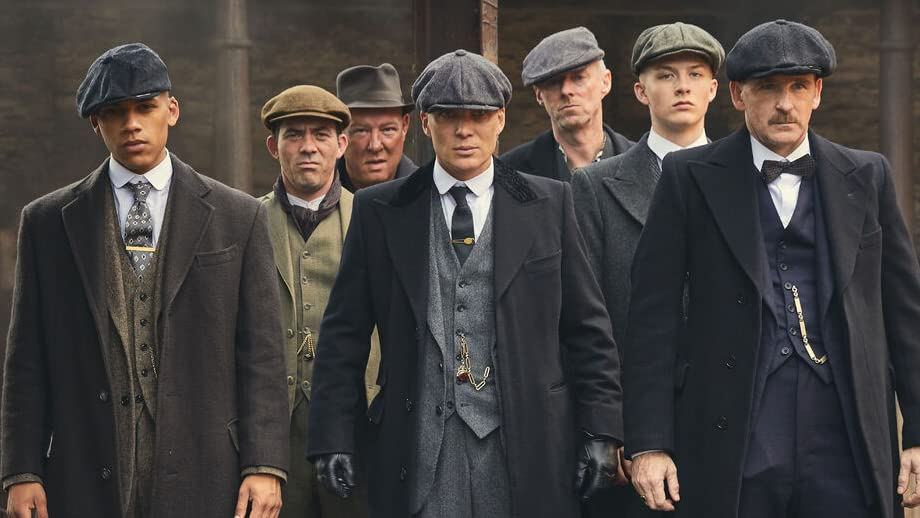Peaky Blinders

“Peaky Blinders,” created by Steven Knight and first aired in 2013, is a British television series that has captivated audiences with its gripping narrative, complex characters, and atmospheric portrayal of post-World War I Birmingham. Set against the backdrop of industrial unrest, political intrigue, and the rise of organized crime, “Peaky Blinders” delves into the lives of the Shelby family and their ascent to power through illicit means.
:max_bytes(150000):strip_icc():focal(1076x450:1078x452)/peaky-blinders-1-78da31624bb342d099a7b8cea5e27083.jpg)
The series centers around Thomas Shelby, portrayed with magnetic intensity by Cillian Murphy, who leads the notorious Peaky Blinders gang. Initially a street gang known for sewing razor blades into the peaks of their flat caps, the Shelbys evolve into formidable players in the criminal underworld. Tommy Shelby, a war veteran haunted by his experiences, navigates the treacherous terrain of business, politics, and family loyalty with steely determination and cunning.
Central to the allure of “Peaky Blinders” is its exploration of power dynamics and ambition. The Shelby family’s rise from the working-class slums to influential figures in Birmingham’s criminal hierarchy is a testament to their ambition and willingness to take risks. Steven Knight’s writing skillfully weaves together themes of loyalty, betrayal, and the consequences of wielding power, drawing viewers into a world where every decision carries weighty consequences.
:focal(634x85:635x86)/https://tf-cmsv2-smithsonianmag-media.s3.amazonaws.com/filer/7b/ba/7bba298e-7e2e-44f0-adb9-b47dfdc1e240/p05m69vt.jpg)
The series is renowned for its richly drawn characters, each with their own motivations and moral complexities. Alongside Tommy Shelby, characters like Arthur Shelby (played by Paul Anderson), the volatile elder brother grappling with PTSD, and Aunt Polly (played by Helen McCrory), the matriarch who balances family loyalty with ruthless pragmatism, add depth and emotional resonance to the narrative.
Thematically, “Peaky Blinders” explores the impact of historical events on personal and societal identities. The aftermath of World War I looms large over the series, influencing characters’ motivations and shaping their perspectives on the world. The show confronts issues of class struggle, the effects of war trauma, and the blurred lines between heroism and villainy, challenging viewers to reconsider notions of morality and justice.

Visually, “Peaky Blinders” is distinctive for its moody cinematography, evocative period details, and stylish aesthetic. The gritty streets of Birmingham, adorned with smoke-filled factories and dimly lit pubs, serve as a stark backdrop to the characters’ ambitions and conflicts. The show’s soundtrack, featuring contemporary rock music juxtaposed against the historical setting, enhances the series’ modern sensibility while underscoring its timeless themes of rebellion and defiance.
Beyond its narrative and visual prowess, “Peaky Blinders” has garnered acclaim for its exploration of gender roles and the empowerment of female characters. Characters like Ada Shelby (played by Sophie Rundle) and Lizzie Stark (played by Natasha O’Keeffe) challenge traditional expectations, carving out roles for themselves in a male-dominated world and exerting influence in their own right.

The success of “Peaky Blinders” lies not only in its compelling storytelling and stellar performances but also in its ability to resonate with contemporary audiences. The series’ exploration of power dynamics, moral ambiguity, and the complexities of human nature transcend its historical setting, inviting viewers to reflect on universal themes of ambition, identity, and the pursuit of legitimacy in a world shaped by violence and ambition.
In conclusion, “Peaky Blinders” stands as a testament to the enduring appeal of complex narratives and morally ambiguous characters. Steven Knight’s creation, brought to life by a talented ensemble cast led by Cillian Murphy, continues to captivate audiences with its blend of historical drama, gritty realism, and timeless themes of power and ambition.











